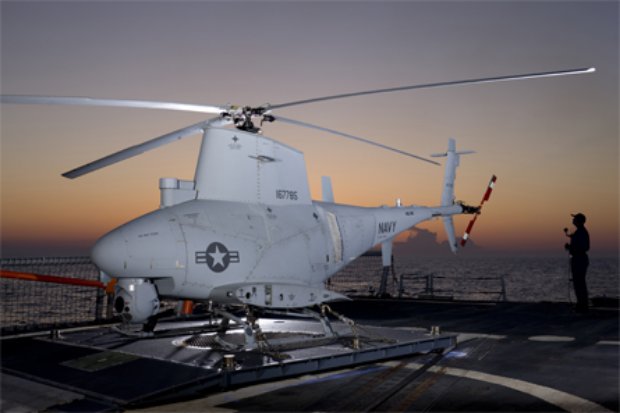 Although already deployed on operations to meet urgent needs, the Northrop Grumman MQ-8B Fire Scout unmanned surveillance helicopter has reliability and sustainability problems that have delayed its regular fielding.
Although already deployed on operations to meet urgent needs, the Northrop Grumman MQ-8B Fire Scout unmanned surveillance helicopter has reliability and sustainability problems that have delayed its regular fielding.
An updated selected acquisition report (SAR) obtained by InsideDefense.com reveals that both the initial operational capability and the full-rate production decision have been delayed by about two years until May or June 2014. Another factor in the delays is the Pentagon’s decision to rapidly develop and deploy the larger MQ-8C version for U.S. Special Forces, based on the Bell 407.
The MQ-8B UAS, which is based on the Schweizer 333 manned helicopter, was pressed into service in 2010 on U.S. Navy frigates conducting anti-terrorist and anti-piracy operations off the Horn of Africa, where one was ditched at sea. The Fire Scout system was also deployed to Afghanistan, where one crashed, and for Operation Unified Protector over Libya, where one was shot down. The U.S. Navy plans to buy 168 production MQ-8Bs, of which 13 have already been delivered, according to the SAR. Seven prototypes have been built.
“The Navy has requested that we focus our efforts on delivering the upgraded MQ-8C Fire Scout while supporting operational missions with the current system,” Northrop Grumman told AIN. The MQ-8C offers twice the endurance and three times the payload of the MQ-8B, the company added.
In the UK, Northrop Grumman has proposed the conversion of a Eurocopter Gazelle helicopter with the Fire Scout system, to meet the Royal Navy’s maritime UAS requirement. The UK has a large fleet of Gazelles in service with the Army and the Marines. “The investment of hundreds of millions of dollars in the Fire Scout system has enabled a vertical-takeoff UAS to be militarily operable in a routine manner,” the company told the British parliament’s Defence Committee last March. The Gazelle was large enough to carry radar, electro-optic/infrared (EO/IR) and signals intelligence sensors simultaneously, as well as the maritime automatic identification system (AIS), it added. However, Northrop Grumman is apparently not one of the four companies selected to bid for the UK’s maritime UAS requirement, for which an invitation to tender was issued in mid-November.
Source: AIN Online
